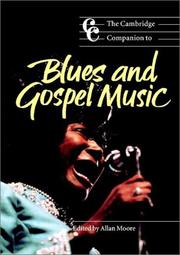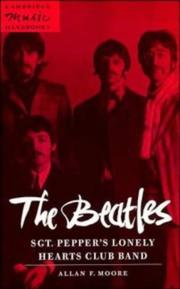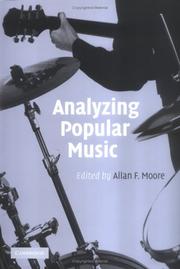| Listing 1 - 8 of 8 |
Sort by
|

ISBN: 0521806356 0521001072 9780521001076 9780521806350 9780511998713 Year: 2002 Volume: *5 Publisher: Cambridge: Cambridge university press,
Abstract | Keywords | Export | Availability | Bookmark
 Loading...
Loading...Choose an application
- Reference Manager
- EndNote
- RefWorks (Direct export to RefWorks)
From Robert Johnson to Aretha Franklin, Mahalia Jackson to John Lee Hooker, blues and gospel artists figure heavily in the mythology of twentieth-century culture. The styles in which they sang have proved hugely influential to generations of popular singers, from the wholesale adoptions of singers like Robert Cray or James Brown, to the subtler vocal appropriations of Mariah Carey. Their own music, and how it operates, is not, however, always seen as valid in its own right. This book provides an overview of both these genres, which worked together to provide an expression of twentieth-century black US experience. Their histories are unfolded and questioned; representative songs and lyrical imagery are analysed; perspectives are offered from the standpoint of the voice, the guitar, the piano, and also that of the working musician. The book concludes with a discussion of the impact the genres have had on mainstream musical culture.
Blues (Chants, etc.) --- Blues (Liederen, enz.) --- Blues (Music) --- Blues (Musique) --- Blues (Muziek) --- Blues (Songs, etc.) --- Gospel music --- Music [Gospel ] --- Gospel music. --- Blues --- Gospel --- blues --- gospel --- jazz --- muziekgeschiedenis --- Music --- 78.39.1 --- History and criticism --- Blues (Music) - History and criticism --- Gospel music - History and criticism --- Rhythm and blues (chants, etc.)
Book
ISBN: 9781409427193 1409427196 Year: 2011 Publisher: Aldershot : Ashgate,
Abstract | Keywords | Export | Availability | Bookmark
 Loading...
Loading...Choose an application
- Reference Manager
- EndNote
- RefWorks (Direct export to RefWorks)
Popular music has become not only one of the most lucrative spheres of human activity, but also one of the most influential on the identities of individuals and communities. Popular music matters, and it matters to many people, people we can only partially understand if we do not understand their music. In the light of this phenomenon the academic study of popular music has become universally established as an active discipline at university level and this timely series brings together the fruits of recent teaching and research in this field. It makes overt recognition of the fact that the study of popular music is necessarily inter-disciplinary and addresses issues as diverse as: the popular music industry and its institutions; aspects of the history of genres; issues in the theories and methodologies of study and practice; questions of the ontologies and hermeneutics of particular musics; the varying influence of different waves of technological development; the ways markets and audiences are constructed, reproduced and reached; and aspects of the repertory without which there would be no popular music to study. The eight volumes in this series span the range of the world's popular music genres from rap, hip hop, soul and jazz, to roots, electronica, dance and club music. Each volume editor has contributed an introductory essay which constitutes a broad overview of the specific group of genres, and made a selection of the most important and influential published articles, papers and other relevant material. Taken together, these volumes offer an invaluable resource for the study of popular music today in all its forms.
Popular music --- Musique populaire --- History and criticism. --- Histoire et critique --- Musique populaire.

ISBN: 0754602982 0754602990 Year: 2001 Publisher: Aldershot : Ashgate,
Abstract | Keywords | Export | Availability | Bookmark
 Loading...
Loading...Choose an application
- Reference Manager
- EndNote
- RefWorks (Direct export to RefWorks)

ISBN: 0521574846 9780521574846 9780511620195 9780521573818 0521573815 0511620195 Year: 1997 Publisher: Cambridge : Cambridge University Press,
Abstract | Keywords | Export | Availability | Bookmark
 Loading...
Loading...Choose an application
- Reference Manager
- EndNote
- RefWorks (Direct export to RefWorks)
Sgt. Pepper's Lonely Hearts Club Band (1967) represents the highpoint of the recording career of the Beatles. This is the first detailed study to be made of this or any other such album, and it demonstrates how serious discussion of popular music can be undertaken without failing either the approach or the music. Dr Moore considers each song individually, tying his analysis to the recorded performance on disc, rather than the printed music. He focuses on the musical quality of the songs and the interpretations offered by a range of commentators. He also describes the context in which the album was written - both within the career of the group itself and within the development of popular music globally, both before and since.
Rock music --- History and criticism. --- History and criticism --- Beatles.
Book
ISBN: 9780754626473 Year: 2007 Publisher: London : Ashgate,
Abstract | Keywords | Export | Availability | Bookmark
 Loading...
Loading...Choose an application
- Reference Manager
- EndNote
- RefWorks (Direct export to RefWorks)
Book
ISBN: 1107485614 0511998716 1280433523 0511077963 0511178603 0511202768 0511305834 0511076398 Year: 2002 Publisher: Cambridge : Cambridge University Press,
Abstract | Keywords | Export | Availability | Bookmark
 Loading...
Loading...Choose an application
- Reference Manager
- EndNote
- RefWorks (Direct export to RefWorks)
From Robert Johnson to Aretha Franklin, Mahalia Jackson to John Lee Hooker, blues and gospel artists figure heavily in the mythology of twentieth-century culture. The styles in which they sang have proved hugely influential to generations of popular singers, from the wholesale adoptions of singers like Robert Cray or James Brown, to the subtler vocal appropriations of Mariah Carey. Their own music, and how it operates, is not, however, always seen as valid in its own right. This book provides an overview of both these genres, which worked together to provide an expression of twentieth-century black US experience. Their histories are unfolded and questioned; representative songs and lyrical imagery are analysed; perspectives are offered from the standpoint of the voice, the guitar, the piano, and also that of the working musician. The book concludes with a discussion of the impact the genres have had on mainstream musical culture.

ISBN: 9780521100359 0521100356 9780511482014 9780521771207 0511482019 0511066694 9780511066696 0511068824 9780511068829 0511060386 9780511060380 9780511306297 0511306296 1280417811 9781280417818 9786610417810 6610417814 052177120X 9781139146289 1107128668 9781107128668 1139146289 051117926X Year: 2003 Publisher: Cambridge Cambridge University Press
Abstract | Keywords | Export | Availability | Bookmark
 Loading...
Loading...Choose an application
- Reference Manager
- EndNote
- RefWorks (Direct export to RefWorks)
How do we know music? We perform it, we compose it, we sing it in the shower, we cook, sleep and dance to it. Eventually we think and write about it. This book represents the culmination of such shared processes. Each of these essays, written by leading writers on popular music, is analytical in some sense, but none of them treats analysis as an end in itself. The books presents a wide range of genres (rock, dance, TV soundtracks, country, pop, soul, easy listening, Turkish Arabesk) and deals with issues as broad as methodology, modernism, postmodernism, Marxism and communication. It aims to encourage listeners to think more seriously about the 'social' consequences of the music they spend time with and is the first collection of such essays to incorporate contextualisation in this way.
Popular music --- Musical analysis --- Music, Popular --- Music, Popular (Songs, etc.) --- Pop music --- Popular songs --- Popular vocal music --- Songs, Popular --- Vocal music, Popular --- Music --- Cover versions --- Analysis, Musical --- Analytical guides (Music) --- Hermeneutics (Music) --- Music analysis --- Music theory --- Music appreciation --- Analysis, appreciation --- History and criticism --- Analytical guides --- Instruction and study --- Musical analysis. --- Analysis, appreciation. --- History and criticism.
Book
ISBN: 9782364411753 2364411750 Year: 2016 Publisher: Dijon: EUD,
Abstract | Keywords | Export | Availability | Bookmark
 Loading...
Loading...Choose an application
- Reference Manager
- EndNote
- RefWorks (Direct export to RefWorks)
This book presents the proceedings of the first international conference on progressive rock in its many manifestations, at the University of Burgundy, Dijon - France, in December 2014, a conference which was the first visible outcome of the Progect network. In his presentation of the Conference, Allan F. Moore suggested that we might address five themes. These five themes are the ones we can find on the website "the progect" (http://rock-progressif.u-bourgogne.fr/). At the Dijon conference, contributors addressed some of these themes in a range of different ways, and Philippe Gonin has gathered together written versions of many of the papers delivered into four sections. The first addresses progressive rock in Eastern Europe, a presence which might seem to outsiders to be somewhat unlikely. The second addresses four case studies from Western Europe, focusing on issues in Spanish and Italian prog. The UK is addressed in the third section, extending beyond the canonic period and questionning issues of the definition of prog bands within the 1970s. The fourth section addresses some initial questions of social use and impact.
Progressive rock music --- Rock progressif --- History and criticism --- Congresses --- Histoire et critique --- Congrès --- Rock progessif --- Congrès --- Progressive rock music - History and criticism
| Listing 1 - 8 of 8 |
Sort by
|

 Search
Search Feedback
Feedback About UniCat
About UniCat  Help
Help News
News